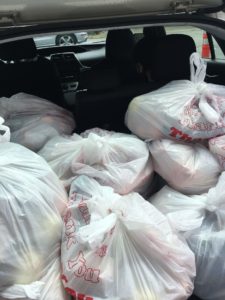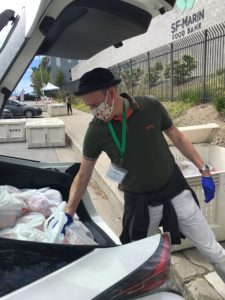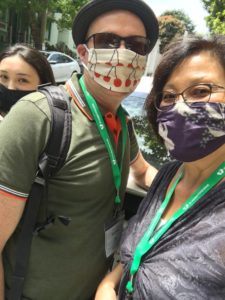Food insecurity hits seniors particularly hard, especially when they are trying to balance a fixed income with the rising cost of living. Even before the pandemic, one in seven adults between the ages of 50 and 80 nationwide were already food insecure. Those who had recently experienced food insecurity were twice as likely to say their diet was fair or poor.
For many low-income seniors, COVID-19 only exacerbates these challenges by layering on the health risks now associated with meeting their basic needs like going out to get food.
Our temporary Pantry at Home program supports the health of seniors by ensuring they are getting a bag of fresh groceries – including fruit, vegetables, grains, and high-quality protein – delivered to them every week. Because of the generous support of our volunteers and partners, close to 12,000 seniors do not need to risk their health to pick up groceries each week.
We spoke with volunteer Esther Honda about her family’s experience delivering groceries to some of our community’s most vulnerable.
Food Bank: When did you start volunteering with us and why?
 Esther Honda: We started volunteering once shelter-in-place started. I knew I wanted our family to volunteer at the Food Bank, and it just worked out well for us to deliver groceries. I have to confess that it seemed like a good excuse to get out of the house but also felt really necessary to help others who could not safely leave home.
Esther Honda: We started volunteering once shelter-in-place started. I knew I wanted our family to volunteer at the Food Bank, and it just worked out well for us to deliver groceries. I have to confess that it seemed like a good excuse to get out of the house but also felt really necessary to help others who could not safely leave home.
FB: Can you describe the experience?
EH: We drive over to the Food Bank warehouse on Pennsylvania Street, back in, and are greeted by friendly volunteers who check us in and offer to help us load up our bags of groceries. There are 3 of us in the family so we manage fine, though. Then we turn on the delivery app and head out to a well-organized list of clients.
FB: You are volunteering with your family?
EH: We volunteer as a family, and we all agree that it’s a great thing to do together! As soon as I signed us up, the family was totally on board.
FB: Are you at all concerned about your health and safety while volunteering?
EH: We wear gloves that the Food Bank hands out, plus our own masks, and we try our best to make as little physical contact as we can.
There has not been one time when we felt unsafe, though, in any neighborhood. I will say that people in all the neighborhoods we have delivered to have been really kind and helpful. It seems like folks can tell you are out there to help others and often offer to hold a door open for you, show you where an elevator or particular house or apartment number is, and to help you get food to the recipients.

FB: Have you learned anything new or surprising during your volunteer experience?
EH: My husband and I have lived in San Francisco for over 30 years, and until we started delivering, there were some neighborhoods in our city we had never been to. It’s expanded our own sense of our city.
FB: How has the volunteer experience impacted you?
EH: Volunteering has made us feel more useful and less like we’re spinning our wheels during this time. We feel like we’re doing something positive and worthwhile. We’ve done lots of things as a family that were community-oriented, but usually, these things have been about the public schools our kids have gone to. This is the first time we’ve gone out to volunteer our support to others as a family. Our teenage daughter has done this on her own, though, so this is actually a bigger step for us, the parents.
FB: What would you say to other people who may be considering volunteering but are on the fence?
EH: Do it! Especially if you are bilingual or have even a tiny bit of language ability in Russian, Spanish, Cantonese, or Mandarin! You are needed, and you will feel appreciated. I have personally been so grateful for the opportunity to get out and volunteer, and the Food Bank makes it easy to sign up for shifts that fit our schedules.
We strongly recommend volunteering with a family member or roommate. It makes dropping off easier and more fun.
FB: What is your favorite part of volunteering?

EH: Our daughter says her favorite part is the cute old people and how appreciative they are when we drop off. They smile and often thank you repeatedly, even when they speak little or no English. It’s very rewarding.
FB: Is there anything else you want to share about your experience?
EH: Some people might feel hesitant driving and dropping off in neighborhoods they are not familiar with or in housing projects that they might have thought to avoid for safety reasons in the past. I have had to confront my own privilege and biases while delivering somewhere unfamiliar for me and have learned the simple truth that it’s ok… These are people, just living their lives! And they’re very appreciative. If nothing else, I hope that the public health reality has shown that we are all, as San Franciscans and as humans, facing this challenge together. We need to support one another, and food is a very basic need that brings joy and togetherness, even when we have to be apart.



Share